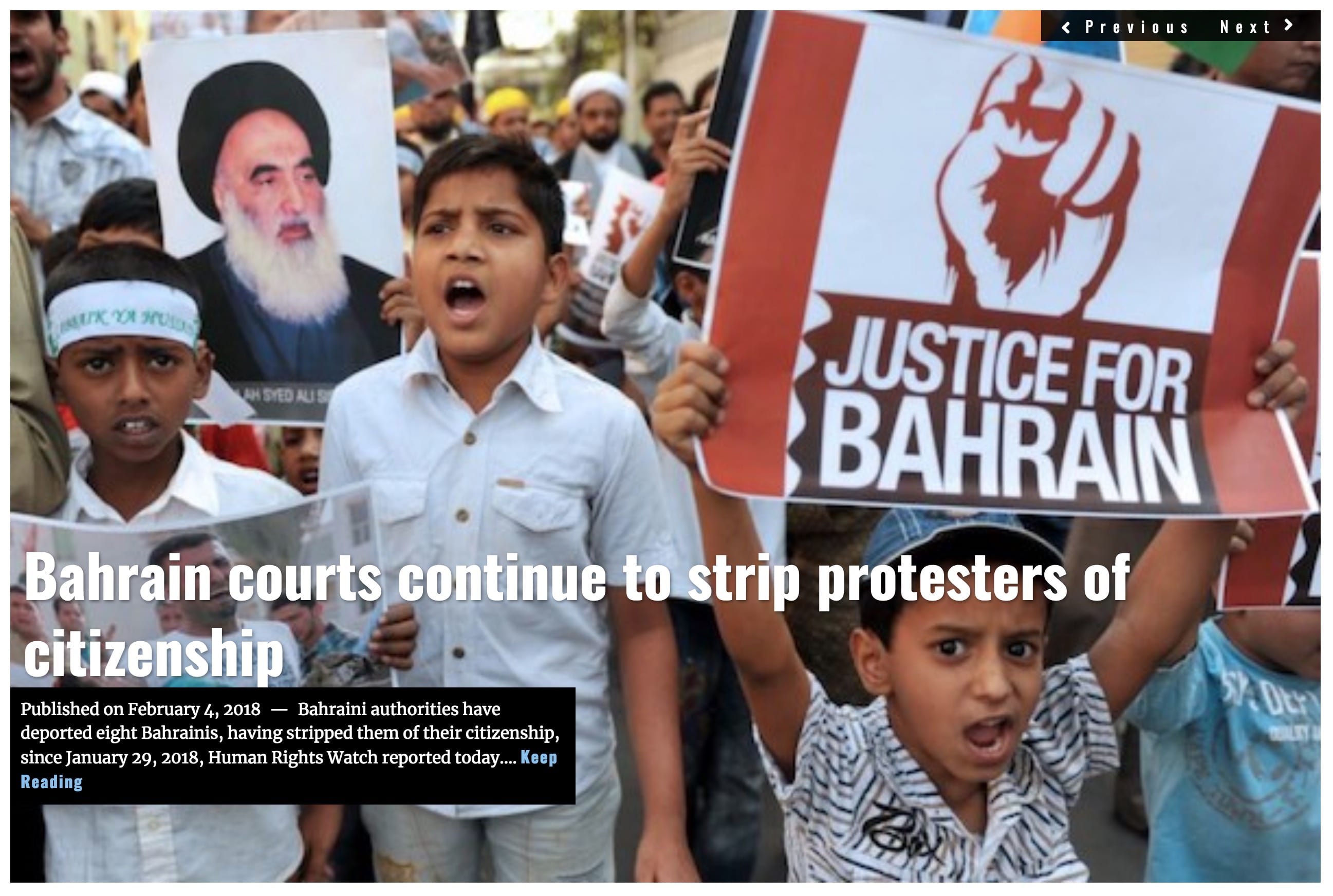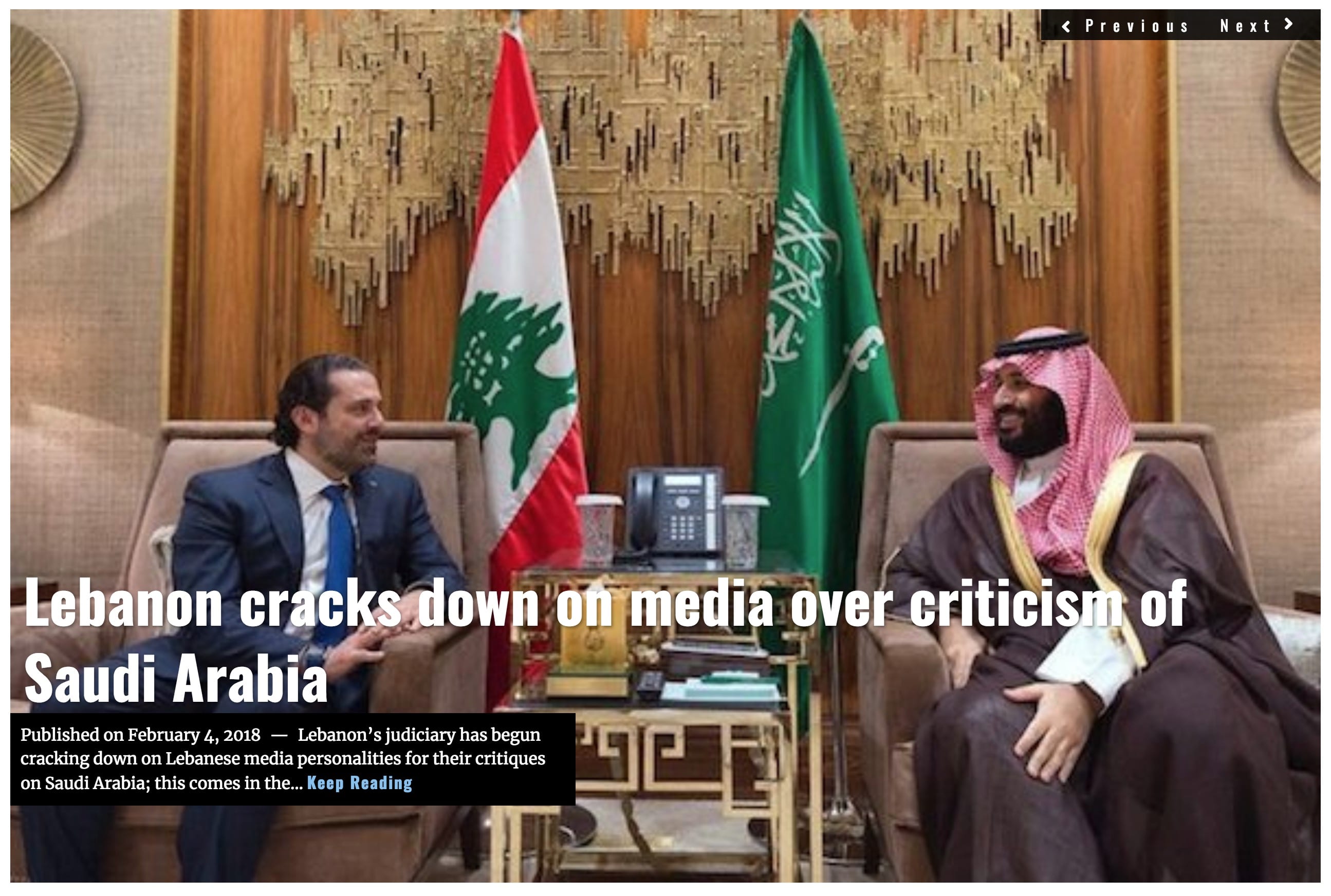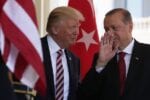Extended Middle East and Northern Africa News Composition Briefing: Regional Low Intensity Conflicts, January 30th to February 4th – Current as of February 5, 2018. This week’s report covers Turkey, Egypt, Saudi Arabia, Bahrain, Jordan and Libya.
| Suggested reading:
“Bahrain courts continue to strip protesters of citizenship” – Lima Charlie News, Feb. 4, 2018
“Lebanon cracks down on media over criticism of Saudi Arabia” – Lima Charlie News, Feb. 4, 2018
Turkey
Security forces have continued their nationwide crackdown on safe houses and individuals believed to be affiliated with the Islamic State. Several raids were carried out this past week, resulting in at least twelve individuals believed to have Islamic State affiliations having been detained, the majority of which have been described as foreigners.
Security forces also continued their long-standing nationwide crackdown on safe houses and on individuals believed to be affiliated with the Kurdish political and/or militant opposition. Several raids were carried out this past week, resulting in at least 90 arrests. A significant portion of the arrests have publicly been described as being in relation to an attack on a domestic revenue service office in the Cukurambar area of Ankara. Turkish security authorities have stated that the explosion was an attack which was perpetrated by Kurdish nationalists. Independent Turkish media has reported that the explosion was caused by a faulty gas line.
The Turkish military incursion into Kurdish controlled enclaves in Syria, which began on January 19th, is still ongoing. Turkey and its backed militia groups face fierce resistance from members of various battle hardened Kurdish militias, not least of which is the People’s Protection Units (YPG). The YPG claims to have repelled a number of Turkish-backed offensives against Kurdish lines.
In the past week, Turkish military operations, with the support of affiliated militia groups, have ramped up in the contested border area. Reports indicate that Turkish forces secured multiple villages in the Afrin Canton previously held by the YPG. Among the towns and villages fallen to the Turkish advancements are Xelil Kalko, Bak Ubasi and Sate. The YPG has only non-specific statements in regards to territory lost to the advancing Turkish forces.
YPG, with the support of affiliated militia groups, have responded with a wide counter offensive. As part of this counter offensive the YPG claims to have recaptured Mount Barasaya, Qorne, and Shengal. Turkey has only made non-specific statements in regards to territory lost to the YPG’s counter-offensive.
On January 27th, the Turkish government called on the US to withdraw troops stationed in Manbij. The US has responded in the negative, stating that it has no intention of withdrawing its troops. US troops operate in a frontline supportive capacity alongside YPG forces as part of the US support for the Syrian Democratic Forces (SDF) coalition. The primary purpose of the US support for the coalition is to counter the remains of the Islamic State.
On January 29th a Turkish military convoy heading towards al Eis passed by the town of Qammari, and was fired upon by Syrian government troops. Qammari is located on the Syrian government side of the conflicted area. Multiple reports state that Turkish forces responded to the attack by shelling Syrian government forces positions in the immediate area.
On February 2nd the Turkish military deployed heavy artillery, 203mm US-provided M110 self-propelled howitzers (SPHs), to provide fire support against Kurdish positions. The M110’s were deployed in addition to the four 155 mm T-155 Fırtına SPHs already in use by rear Turkish positions. The M110’s were dispatched to the area on January 28th, but were not utilized until February 2nd.
Fierce fighting between militia groups supported by the Turkish government, and the YPG has been reported in the town of Meranaz. Turkey has claimed that 802 “terrorists” had been “neutralised”, an average of 75 day, during the operation so far. As both sides are only haphazardly reporting their casualty numbers, and then always low numbers, it is at present difficult to grasp the casualty rates. However, eyewitness reports state that both sides are suffering heavy casualty rates.
-January 30th; Northern Iraq
Turkish Air Force struck at least eight ground targets in northern Iraq. These targets included shelters, hideouts and arsenals, and were described as belonging to militants. The Iraqi regions struck were Zap, Avasin, Basyan, and Hakurk.
Egypt
Egyptian security forces continued their nationwide operations against safe houses and individuals believed to be affiliated with the Islamic State. At least one individual believed to be affiliated with the Islamic State was killed by government forces in the past week, with a further five having been detained.
Security forces continue their operations against the Muslim Brotherhood (MB), and associated organizations, throughout the country. In the past week several raids have been conducted against believed safe houses and individuals with alleged MB affiliations. According to reports, the raids resulted in at least 10 individuals arrested.
Security operations continue along the Egyptian-Libyan border area with the Egyptian Air Force striking Salafist-Jihadist group convoys crossing from Libya to Egypt. The border land, on the Libyan side, has become a haven for emerging new militia groups, including the al Qaeda-linked group Ansar al-Islam.
Kingdom of Saudi Arabia (KSA)
The Shi’a al Houthi militia in Yemen continues to send ballistic missiles aimed at population centers in Saudi Arabia. The majority of incoming missiles are reportedly shot down by the Saudi surface-to-air system (SAM), operated by the Royal Saudi Air Defense forces, which consists primarily of a series of US provided MIM-104 Patriot systems. The al Houthi tend to utilize variations of Soviet-era designed ballistic missile systems. One such example is the Qaher-1 missile, which is an improved variation of the Soviet SA-2 short to medium range ballistic missile design. There were no casualties reported this week in relations to al Houthi missile strikes.
Cross-border activities between Saudi and Yemeni militia groups continue to be an ongoing concern. The so called “no mans land” that makes up the border between the two countries is riddled with landmines from past conflicts, which often cause collateral for patrolling border units. The positions of the landmines are largely unknown even by the organizations that placed them, as the movement of the sand often displaces the mines. Al Houthi forces often use the area to launch rocket attacks against Saudi targets.
The Saudi Ministry of Health (MoH) has stated that it had detected two new cases of the Middle East Respiratory Syndrome Coronavirus (MERS-CoV) between January 30th and February 2nd.
Bahrain
Shia government opposition groups continue to call for nationwide protests, but have so far failed to reach a critical mass with the majority of resulting public gatherings containing less than fifteen people. Security forces made minor arrests relating to Shia opposition groups. The government is however reporting that a noteworthy increase of Shi’a militia and government opposition violence occurred throughout 2017. This trend is expected to continue throughout 2018.
Various Shi’a affiliated militia movements continue to claim to have carried out various attacks against Bahraini security forces and installations. Few of these attacks ever receive an official confirmation from the Bahrain government. This week a handful of alleged attacks were claimed to have been carried out by a wide array of groups, including the Iran/Hezbollah affiliated Popular Resistance Brigades (Saraya al-Muqawama al-Shabiya) group.
Bahrain is quickly finding itself on the forefront of the increasingly active low intensity conflict between the Kingdom of Saudi Arabia and the Republic of Iran. Several incidents, particularly a recent surge in Improvised Explosive Device (IED) attacks, in the past few months have been attributed to Shi’a militia organizations that allegedly have direct or indirect ties to Iran.
-January 31st; Manama, Bahrain
Fifty-eight people were sentenced on terrorism charges, two of which were sentenced to death. Of the fifty-six, nineteen were sentenced to life in prison and thirty-seven for up to 15 years in jail. Forty-seven were also stripped of their Bahraini citizenship. The prosecutor alleged that the fifty-eight people on trial were part of a Shi’a terrorist cell that was training and preparing to use heavy weapons and explosives against infrastructure targets.
Suggested reading: “Bahrain courts continue to strip protesters of citizenship” – Lima Charlie News, Feb. 4, 2018
Jordan
-January 30th; Amman, Jordan
Israeli Foreign Ministry spokesman Emmanuel Nahshon stated that the Israeli Embassy in Amman will be “gradually reopened” after a diplomatic spat between the two countries. As of yet, no new ambassador has been appointed.
-February 3rd; Dublin, Ireland
RyanAir, the Irish low-cost carrier, announced 14 new flight routes between Jordan and Europe; Amman to Milan, Budapest, Bologna, Krakow, Bucharest, Paphos, Prague, Brussels, Vilnius and Warsaw, to open in March. RyanAir will also begin additional routes from Aqaba to Athens, Rome, Cologne and Sofia, also set to open in October. Fourteen percent of Jordan’s GDP is estimated to come from tourism.
Libya
Security forces affiliated with the eastern Libyan government have engaged in a series of skirmishes against Islamic State-affiliated militia groups during the weekend. The skirmishes have resulted in a total of three individuals from the Islamic State killed, and two soldiers killed. Five Islamic State affiliated individuals were also injured in at least one skirmish. The skirmishes have primarily been focused in and around the Dhahra oilfield. The eastern Libyan government is situated in the city of Bayda.
LIMA CHARLIE, MENA Desk
Lima Charlie provides global news, insight & analysis by military veterans and service members Worldwide.
For up-to-date MENA news, please follow us on twitter at @LimaCharlieMENA and John Sjoholm @JohnSjoholmLC
In case you missed it:






![STRATEGIC OPTION | Syrian Endgame - The Hard Truth [Lima Charlie News][Photo: Bulent Kilic]](https://limacharlienews.com/wp-content/uploads/2019/05/STRATEGIC-OPTION-Syrian-Endgame-e1558501175322-480x384.png)
![Image The Alevis Dilemma [Lima Charlie News]](https://limacharlienews.com/wp-content/uploads/2019/04/Alevis-Erdogan-480x384.png)
![Africa’s Elections | In Malawi, food, land, corruption dominate [Lima Charlie News]](https://limacharlienews.com/wp-content/uploads/2019/06/Malawi-election-Food-land-corruption-480x384.jpg)
![Image The Rwandan Jewel - Peacekeepers, Conflict Minerals and Lots of Foreign Aid [Lima Charlie World]](https://limacharlienews.com/wp-content/uploads/2019/03/Rwanda-Jewel-480x384.jpg)
![Image [Women's Day Warriors - Africa's queens, rebels and freedom fighters][Lima Charlie News]](https://limacharlienews.com/wp-content/uploads/2019/03/Womens-Day-Warriors-Lima-Charlie-News-480x384.jpg)
![Image Zimbabwe’s Election - Is there a path ahead? [Lima Charlie News]](https://limacharlienews.com/wp-content/uploads/2018/09/Zimbabwe’s-Election-Is-there-a-path-ahead-Lima-Charlie-News-480x384.png)
![[Silver lining for China in Zimbabwe’s violent elections][Lima Charlie News]](https://limacharlienews.com/wp-content/uploads/2018/08/Screen-Shot-2018-08-02-at-12.51.35-PM-480x384.png)

![STRATEGIC OPTION | Syrian Endgame - The Hard Truth [Lima Charlie News][Photo: Bulent Kilic]](https://limacharlienews.com/wp-content/uploads/2019/05/STRATEGIC-OPTION-Syrian-Endgame-e1558501175322-150x100.png)